When it comes to starting a business, there’s a lot to know. The best book for starting a business can help you get started. But no one business book covers it all. From writing your business plan, to budgeting, managing staff, or changing your habits for success, there’s a business book out there for you. And what about the unique challenges faced by female business owners or navigating the landscape tech start-ups and disruption?
In this ranking, we break down 10 business books into 10 useful categories for any small business owner, with a combination of our own research and the input of small-business owners and authors from all across the country. Hard work and perseverance are crucial to the success of small business, but take some time to learn the wisdom of other small-business owners conveyed through the best books for small-business owners, and you’ll be one-step ahead of the competition.
BP’s Picks for the Best Best Books for Anyone Starting a Business
- Best Overall: The E-Myth Revisited: Why Most Small Businesses Don’t Work and What to Do About It
- Best to Handle Change: Disrupt Yourself, With a New Introduction: Master Relentless Change and Speed Up Your Learning Curve
- Best for Women Business Owners: Women Who Launch: Women Who Shattered Glass Ceilings
- Best for Social Responsibility: Guerrilla Marketing to Heal the World: Combining Principles and Profit to Create the World We Want
- Best for Startups: The Startup Owner’s Manual: The Step-By-Step Guide for Building a Great Company
- Best for Freelancers: The Business of Writing & Editing: Practical Tips & Templates for New Freelancers
- Best for CEOs: How Cohesive is Your Company?
- Best for Innovation: The Obstacle Is the Way
- Best for Scalable Businesses: Scaling Up: How a Few Companies Make It….and Why The Rest Don’t
- Best for Long-Term Planning: A Company of One
How to Find the Best Book for Starting a Business?

In this article we wanted to present not just our opinion on the best books for starting a business, we also wanted to know which books helped actual business owners get started and sustain success. We even heard from some authors about how their experience in small business puts their book among the very best small-business books available.
Keep reading to find out everything that put these books among the very best, but for now, here’s a quick look at the 10 best books for starting a business. Some of the mentioned books are also available on Z library website.
Best Overall: The E-Myth Revisited: Why Most Small Businesses Don’t Work and What to Do About It
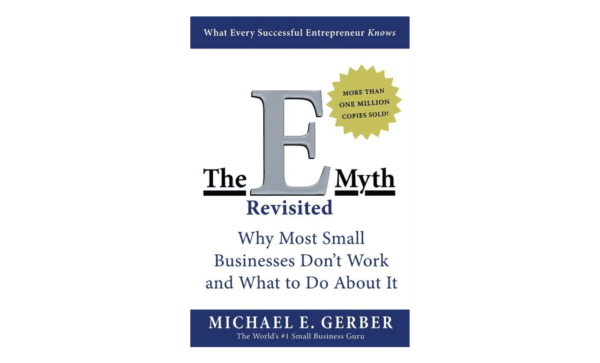
The E-Myth Revisited: Why Most Small Businesses Don’t Work and What to Do About It by Michael E. Gerber earned its spot as the best book for starting a business on the strength of several recommendations from small-business owners. The first came from Tori Rhodes, founder of the birding website The Birding Guide.
Published in 2004, the revised edition of the original E-Myth book “presents a great plan of action for business owners,” Rhodes explains in an email, preventing owners from getting trapped in “it’s all me” thinking by listening to their customers and outsourcing and delegating as much of their work as possible. According to Gerber, doing so frees up time for an owner to truly focus on growing their business.
“I truly believe you can’t build up a business asset without creating processes that are repeatable and can be delegated,” Rhodes says.
Jeff Kolodny, founder of Kolodny Photo, also found the book useful when starting his business, helping guide him from a “technician” mindset—working for someone else—to that of a business owner. At some point, the technician-turned-business-owner must make this mental change,” Kolodny says, “because if they don’t, the business will die or the technician will go crazy. Before anyone decides to start a business, they must read this book,” he continues.
Best to Handle Change: Disrupt Yourself, With a New Introduction: Master Relentless Change and Speed Up Your Learning Curve
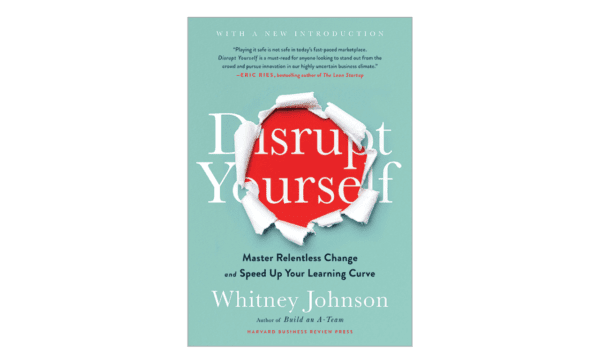
Change is a constant when it comes to running a small business. Even more so in the age of disruption, as start-ups like Uber redefine entire industries. To help small-business owners attain the disruption mindset and accommodate near constant change, several small-business owners suggest Disrupt Yourself: Master Relentless Change and Speed Up Your Learning Curve by Whitney Johnson.
Adem Selita is co-founder of The Debt Relief Company, helping American consumers get out of debt and better manage their finances. Selita says Johnson’s book taught him that small business owners need to embrace disruption. “Disruption ultimately leads to all of us being happier,” Selita says, and that’s especially true for those leading high-growth, fast-paced organizations. The process of disruption, according to the book, challenges small-business performance by speeding up the learning curve and bettering employees.
“I recommend this book for leaders looking to push the needle within their organization and create a workforce that welcomes disruption and a culture of continuous growth and improvement,” Selita says.
Best for Women Business Owners: Women Who Launch: Women Who Shattered Glass Ceilings

All business owners face adversity, but especially women small-business owners. To help navigate the unique challenges faced by women entrepreneurs, Michelle Devani, founder of Love Devani, recommends Women Who Launch: Women Who Shattered Glass Ceilings by Marlene Wagman-Geller.
In the books, readers learn the stories behind some of the most well-known brands, businesses, and organizations launched by women. The book tells the stories of some of history’s most successful female founders: from Estée Lauder redefining the cosmetic industry to Juliette Gordon Low who founded the Girl Scouts, and it includes empowering quotes by and for women. That’s just the kind of motivation required for women to succeed at whatever they put their mind to: from careers in business to launching their own companies.
Devani calls the book a “collection of inspiring stories from women entrepreneurs, artists, and activists behind the famous companies and brands today.” She goes on to say, “This book is an enjoyable read. Motivating and encouraging, this relates to everyone who faces obstacles and seeks to shatter glass ceilings.”
Best for Social Responsibility: Guerrilla Marketing to Heal the World: Combining Principles and Profit to Create the World We Want

For businesses that not only want to turn a profit but also change the world, we recommend the best business book for starting a socially responsible business: Guerilla Marketing to Heal the World by Jay Conrad Levinson and Shel Horowitz. And who better to hear about the book than from the authors themselves? According to Horowitz, the book “shows businesses how they can go beyond mere sustainability, keeping things the same, to regenerativity,” or making things better, he says.
Featuring guest essayists like Frances Moore Lappé, author of many books on food and democracy, and Cynthia Kersey, author of Unstoppable: 45 Powerful Stories of Perseverance and Triumph from People Just Like You, the book teaches small businesses how to identify, develop, and market profitable products and services, turning hunger and poverty into sufficiency, war into peace, and catastrophic climate change into planetary balance.
The book has more than just our endorsement; it has earned praise of the business-exec-turned bestselling-business-author Seth Godin, Chicken Soup for the Soul‘s Jack Canfield, and the executive director of GreenBiz.com, among many others.
Best for Startups: The Startup Owner’s Manual: The Step-By-Step Guide for Building a Great Company
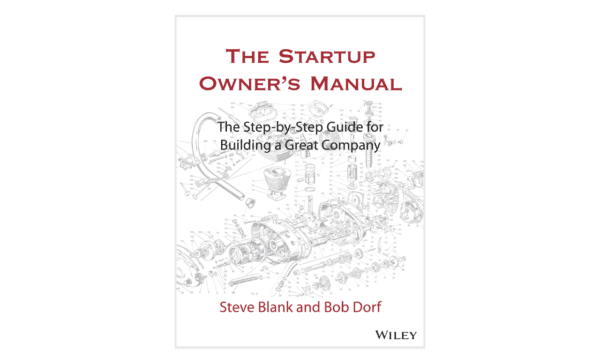
Start-ups in the ever-changing tech industry face many unique challenges, and the next book in our ranking The Startup Owner’s Manual by Steve Blank provides an invaluable roadmap to navigate that terrain, emerging on the other side with a better and stronger business. The book helped Gene Caballero, founder of Your Green Pal, described by some as the Uber for lawn care, get his business off the ground, and he recommends it as one of the best books for anyone starting a business of their own.
For Cabellero, author Steve Blank laid out all of the pre-work that was needed to be done before a company should even be started, beyond just writing a business plan. Topics covered include, “getting out of the building and getting feedback from random stranger,” Cabellero says, “to being on top of your company and not in it.” Cabellero goes on to say that Blank takes real-world examples, explaining everything in detail. “He gave me the confidence and the reasoning to get the ball rolling on becoming an entrepreneur,” Cabellero says.
Best for Freelancers: The Business of Writing & Editing: Practical Tips & Templates for New Freelancers
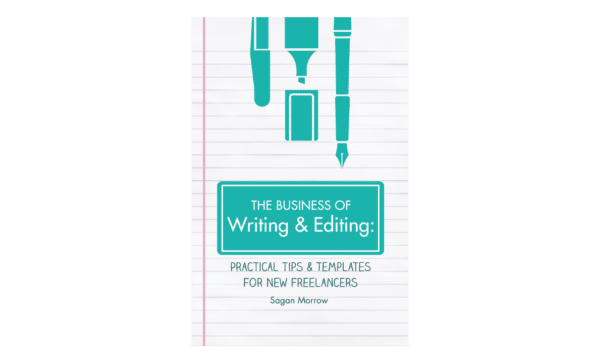
Freelancers know that making a go of it on their own is a lot like running a small business. The best business book for freelancers, especially in the publishing industry, is The Business of Writing & Editing: Practical Tips & Templates for New Freelancers by Sagan Morrow. Teaching aspiring freelancers the foundations for how to get started with their own small business, the book is part memoir and part how-to guide, and an excellent resource for providing encouragement, motivation, guidance, and actionable steps to become a successful freelancer.
But don’t just take our word for it. one of Morrow’s readers had this to say about the book: “After reading, I have a clearer picture of what freelancing can look like, and I have decided that it is something I want to pursue. In fact, I’ve already started taking steps to make the transition from my current 9-to-5 to full-time freelancing!”
Business Pundit appreciates that the chapters in the book are clear and concise, and the tone is friendly and personable while remaining informative, with plenty of appendixes with checklists and sample templates of invoices and contracts to help any freelancer get started.
Best for CEOs: How Cohesive is Your Company?
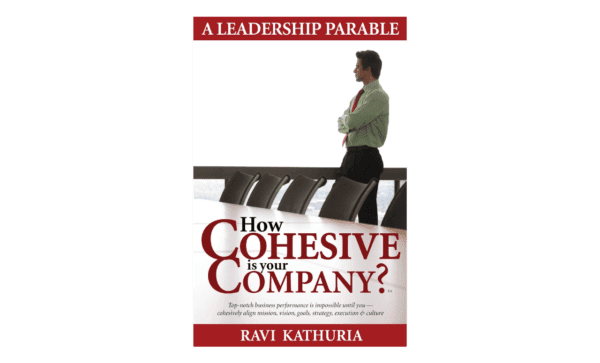
Launching an enterprise is challenging enough, and leading your team as CEO adds extra layers of complexity. If that’s the situation you’re in, consider the next book, How Cohesive if Your Company: a Leadership Parable by Ravi Gopaldas Kathuria. Teaching the simple and intuitive “cohegic” management method, Kathuria’s easy-to-read book tells the story of a brand-new CEO and what he needs to understand about running a business.
The author tells Business Pundit in an email that if a business lacks clarity of purpose and mission, without a clear business model and clear values, that business will struggle. But CEOs, Kathuria says, also need to understand themselves. The Cohegic Method, Kathuria explains, “is critical for any business owner. If they do not follow a management method, they are doing themselves a disservice.”
Without a business model and a clear set of values, a “business owner will spend a lot of time unproductively,” Kathuria cautions.
Best for Innovation: The Obstacle Is the Way
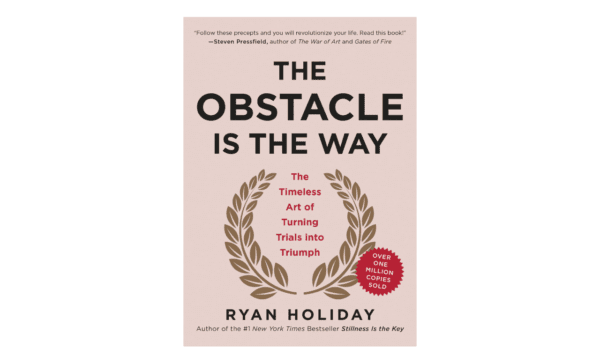
Any business owner will tell you that the need for innovation doesn’t stop once the business is launched and underway: What works one day may not work the next. How can a small-business owner turn obstacles into opportunities? That’s the subject of The Obstacle is the Way: The Timeless Art of Turning Trials into Triumph by Ryan Holiday. Jason Ziemniak, founder of Industrial Hoppers, manufacturer of steel self-dumping hoppers made from ergonomic material, says although the book didn’t provide him with his business concept, it did give him the motivation to move forward: transitioning from life as a salesman to running his own company.
The premise of the book is simple: Focus your energy on the things that are in your power to change without wasting energy on what’s outside of your control. But the philosophy is inspiring because it can be applied to the everyday life of a small-business owner, ranging from how they schedule their days to how they resolve conflicts, and even how they manage their diets.
Best for Scalable Businesses: Scaling Up: How a Few Companies Make It…and Why The Rest Don’t
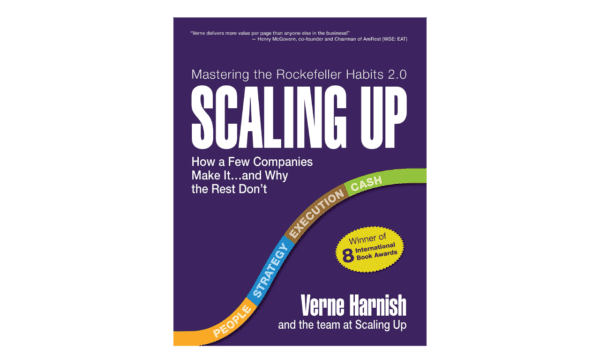
All business starts small, but you have big ambition to grow. The best book for scalable business is Scaling Up: How a Few Companies Make It…and Why The Rest Don’t by Verne Harnish. Harnish’s book asks the question: Now that you’ve disrupted an entire industry, what’s next? Where does a business go from there? Businesses should not be judged by how they open the game but instead by how they finish it.
Jason Akatiff, entrepreneur and co-founder of Boundery, a website shining a light on the world’s best lifestyle products, calls the book “an MBA in 250 pages,” saying it’s “one of the best books for an aspiring entrepreneur.”
“It provides you with the most useful information you will need to succeed as a business owner, in part giving you confidence to push through and follow your goals,” Akatiff goes on to say. Topics covered in the book include essentials for any entrepreneur when starting a scalable business, including people, strategy, execution, and cash.
“I learned a lot of valuable lessons from this book about systems and processes and how to scale them,” Akatiff says, “as well as culture and how to manage and hire the right type of people.”
Best for Long-Term Planning: A Company of One: Why Staying Small Is the Next Big for Business
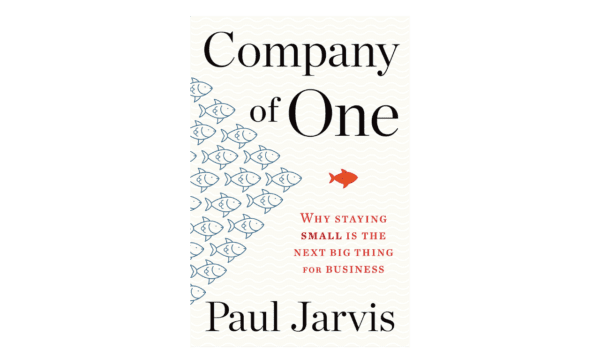
But do all businesses need to grow in order to be successful? Not necessarily, according to Paul Jarvis, author of A Company of One: Why Staying Small Is the Next Big for Business. Patricia Marshall, founder of Luminare Press, a self-publishing consulting firm, found Jarvis’ insight valuable when building a business that was just the size for her purposes.
In the book, Jarvis asks: What if, instead of building a multibillion dollar business, the ultimate payout for a small business owner is to turn a profit, set your own hours, and work for yourself?
“Business gurus often present an either/or scenario,” Marshall explains in an email, “rapid scaling using venture capital (preferred by most) or remain an unscalable lifestyle business without security.” Jarvis’ book presents the idea that you can scale a business without selling your soul to an investor, and, Marshall continues, “maybe not reaping a mega-billion payout; create a sustainable company that will serve you well.”

